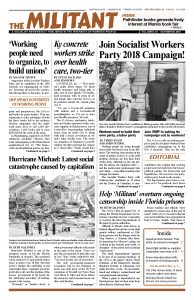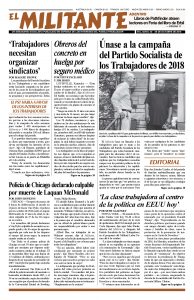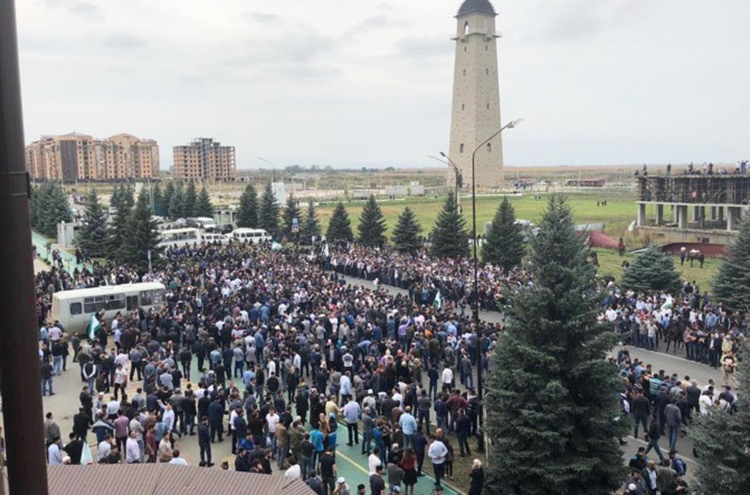Thousands have taken to the streets daily since Oct. 4 in Magas, Ingushetia, to protest a “land swap” that turns 5 percent of the country over to the rulers in neighboring Chechnya. Protesters have set up an encampment there, with actions growing to include thousands each day. They are also demanding the resignation of Moscow-appointed President Yunus-Bek Yevkurov, who signed the deal behind the backs of the people.
The protesters have united people of all stripes in the country, who have fought for decades for national sovereignty. They have not been deterred by authorities’ demands that they disperse, warning gunshots by Russian troops or threats of military intervention by Chechen head of state Ramzan Kadyrov. Other Ingush have donated food and clothing to sustain demonstrators.
According to an Oct. 9 report in the Caucasian Knot news website, Chechnya will get 66,200 acres — 26 times more territory than Ingushetia is supposed to receive in return — in the so-called land swap.
The heads of the two governments agreed to the deal in September, watched over by Russian President Vladimir Putin’s envoy to the North Caucasus Federal District, where Ingushetia and Chechnya are located.
Putin had previously cancelled elections in the North Caucasus that are part of the Russian Federation, imposing officials he chose to administer governments there.
With a population of just under half a million, Ingushetia is the smallest republic in the Russian Federation, and is majority Sunni Muslim.
Like other peoples across the region, the Ingush were subjected to plunder and national oppression by czarist rulers of Russia for centuries.
The overturn of capitalist rule by millions of working people in the Bolshevik-led 1917 Russian Revolution opened the door to ending national oppression and forging unity among workers and farmers. The revolutionary government guaranteed the unconditional right to self-determination of peoples long-oppressed under czarism and established a voluntary federation of the different nations making up the Soviet Union.
The Ingushetia Autonomous Oblast existed from 1924 until 1934, when it was subsumed in the Chechen-Ingush Autonomous Oblast. The counterrevolutionary triumph by forces led by Stalin had extinguished the revolution’s championing of national rights. A prison house of nations was reimposed across the Soviet Union.
The Chechen-Ingush Autonomous Republic was abolished during the second imperialist world war. Its 650,000 inhabitants were forcibly deported to Siberia and Kazakhstan in 1944. Stalin falsely accused the Ingush and Chechens of collaborating with the German Nazis. At least a third perished in 13 years of exile.
Moscow barred the Ingush from returning until 1957 when the Chechen-Ingush Autonomous Republic was restored. But it was shorn of the Prigorodny region, which Stalin repopulated with people from North Ossetia.
After the Soviet Union imploded in 1991, two separate republics were established in Chechnya and Ingushetia.
In 1992 Ingush nationalists formed armed groups to ensure, they said, “that all the Ingushetian territories seized by Stalin are returned to the Ingush Republic.” But with the aid of Moscow their uprising was crushed.
Both the Ingush and Chechens were oppressed by Moscow. In the 1990s and early 2000s Russia’s rising capitalist class waged two wars against Chechens fighting for their independence, leaving 30,000 dead. Moscow defeated the insurgents and installed the Kadyrov government, reaching an alliance with him that gave Chechnya’s rulers a wide degree of autonomy as long as they stayed loyal to the Kremlin.
Chechnyan authorities have long disputed the borders between that country and Ingushetia, utilizing Stalin-era maps from the 1930s to justify their demands for Ingush territory. In 2013 Chechen security forces organized an incursion into Ingushetia under the pretext of hunting down domestic political opponents they claimed were based there.
In response to today’s mass protests, Putin telephoned Yevkurov to press him to restore calm to the area. Yevkurov says that surrendering the land is needed for “regional stability.”


